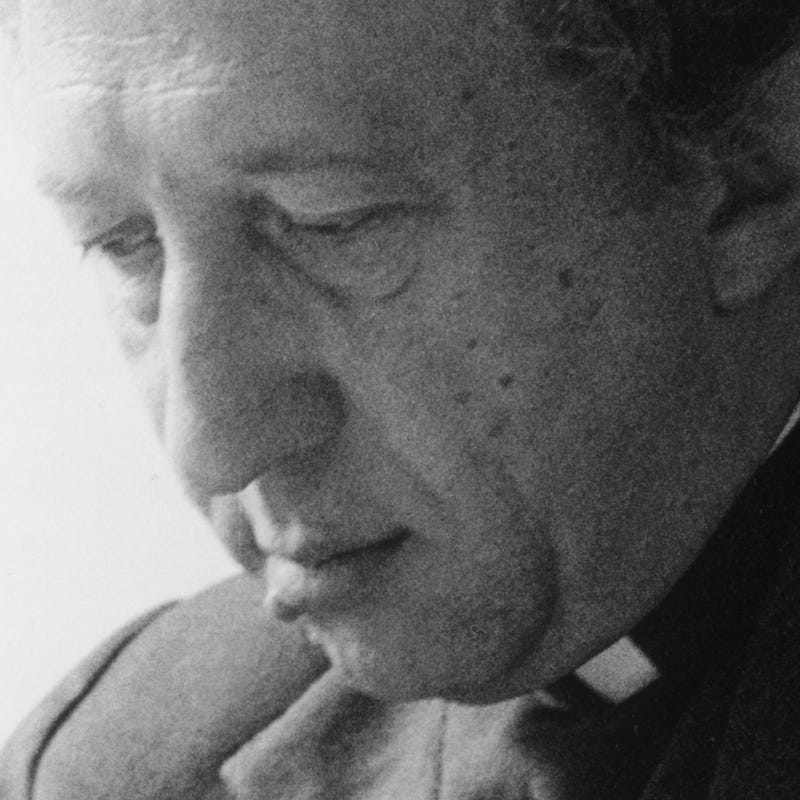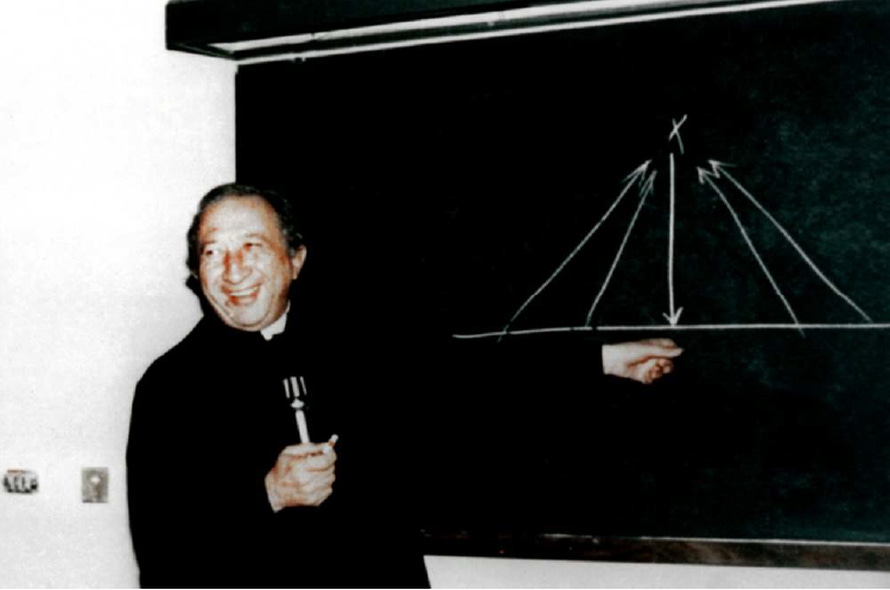Hey everyone, I hope it’s all going well for you as we approach Thanksgiving! Sorry it’s been 2 weeks without anything new…I was sick for a week or so and then had some visitors in town. Thanks for your patience!
__
Today I want to propose perhaps a different lens for viewing morality than what many are used to, and then begin to draw out some conclusions that combine quite well (I think, anyway) the conclusions we drew in the last post about the Lordship of Jesus and the different lens I’m about to propose. But first, let me give you a little introduction to my friend Fr. Luigi Giussani, since it’s his ideas we’ll be working with.
Who is Giussani?
Fr. Luigi Giussani was born in 1922. He entered the seminary system in Milan at age eleven and was ordained a priest in 1945. As a teenager, he fell deeply in love with the study of literature, specifically the poetry of the Italian poet Giacomo Leopardi. By age 16 he had memorized all of Leopardi’s poetry, marveling at the poet’s ingenious way of putting the depth of the human experience into words; the questions provoked by the poetry were so powerful for Giussani that he later wrote that these questions “overshadowed all others for me.”1
As a young priest, Giussani served as a high school theology teacher. He was impressed by the young students drive for study and desire to learn, but was appalled by their lack of faith. The young people of Italy in the 1950s knew the teachings of the Catholic Church but lacked a sense of the reality of Jesus Christ in their lives; they had never had the encounter with Christ that makes faith possible. Because of this, the proposals of the Church for their own lives and the direction of society seemed to them as something stuffy, oppressive, and lifeless.
Giussani founded the Gioventù Studentesca, (GS or Student Youth), which over time developed into the much larger lay ecclesial movement known today as the Fraternity of Communion and Liberation (CL). He began to tailor his classes to contain far more than the “nuts and bolts” teachings of the Church, but not because he thought they were frivolous and unimportant. On the contrary, Giussani had such a love for the Christ and the Church that he recognized that taking to the time to outline "the religious sense and the reasonableness of faith, the hypothesis and reality of Revelation, the pedagogy Christ uses in revealing Himself, and the nature of the Church as the continuity of Christ’s presence in history up to the present”2 was, for these students, the themes of absolute importance for formation in the Christian life.
I first came across Fr. Giussani in 2012, as a college seminarian at St. Thomas in Minnesota, but didn’t really begin to engage him until 2016. He is my inspiration for my work as a high school teacher, but certainly is a model for my own priestly ministry and, much more broadly, is hugely influential in the way that I think and engage with the Christian mysteries. He’s one of the authors (like C.S. Lewis and Chesterton) who, when I read them, I find myself thinking “this guy is right. I can’t explain it necessarily, but what he’s saying is the truth.”
If you want to learn more about Fr. Guissani and CL, find out more here. You can also get yourself a copy of his official biography which, at a whopping 1,392 pages, can double as a doorstop or blunt force object in the case your home is being burgled.
Memory and Desire
In 1980, Giussani wrote a text entitled Morality: Memory and Desire. The book, published by Ignatius Press in English in 1986, conveys the topic of Christian morality3 through discussions of prayer, foundations for sanctity, some clarifications about sin, and the centrality of the Church as Christ’s Body as being the “locus” of morality.
I think the way Giussani presents morality is genius. Morality is essentially an equation, a combination of two incredibly important aspects of human life: memory and desire. Think about it: everything a person does is influenced by those two things.
When we do something for the first time, like try a new coffee shop, it’s out of a sense of desire; it’s nuanced desire: sure, I want good coffee…but I also love the coffeeshop vibe and the great space to work and the pastries. Part of that desire is driven by the possibility of those things themselves but part of it is also because I have lots (lots) of pleasant coffee shop memories, from all over the world, that tell me it’s reasonable to desire what I desire and that it’s also very likely that my desire will be met at the new coffee shop I’m about to try.
That’s a trivial example, but hopefully the point is clear enough. What we’ve been through, what’s happened to us, what’s been done for us and against us all form the core of our memories. As those memories interact with our desires, the combination plays a massive role in determining how we actually act.
(This also represents an intersection with psychology that I think is worth exploring more at a later time. How conscious are we really of the memories and desires that motivate us?)
A Christian Personality?
Giussani wisely draws a connection between how we act and who we are. It’s true that how we act doesn’t necessarily define who we are - JPII reminded us that we’re not “the sum of our weaknesses and failures, but of the Father’s love for us” - but they are connected. How we spend our time hugely influences the kind of person we develop into over time, and, at least in theory, the person we develop into has an equally huge influence on how we spend our time.
The introduction of Morality: Memory and Desire, entitled “Essential Points for the Formation of a Christian Personality”, presents five foundational principles that make Christian moral living and prayer possible. Every decision, every action represents and indication of our closeness with God and and our awareness of the broader task of the Christian life, which is nothing more and nothing less than “giving witness to the faith.”4
Giussani writes,
The Christian has a specific task in life, which is not the exercise of a determined profession, but faith: to give witness to faith, to give witness to it within his particular state of life. We have our families, we have our professional, but “the” task is to give witness to the faith. We have been chosen for this.5
At the beginning of his public ministry in Galilee, Jesus begins his preaching by saying, “This is the time of fulfillment. The Kingdom of God is at hand. Repent and believe in the Gospel.” (Mk. 1:15) Paul tells the Corinthians: “Behold, now is a very acceptable time; behold, now is the day of salvation.” (2 Cor. 6:2) What else does this mean except that salvation is already present, the Kingdom of God was already beginning to come to fruition from the moment of the Incarnation. In the formation of an integrated moral life, Giussani points to John the Baptist as our companion for this attitude and he urges us to compare our own attitude toward the faith and right living to the attitude of John the Baptist.
John the Baptist, in his work as a prophet, proclaimed that salvation was already present, and pointed it out to men: we can compare the attitude that our Christian task [of witness] requires from us with his.6
His attitude - both that the Kingdom is at hand and that it our life’s task to give witness to this faith - is the “norm” of the Christian. A lot of people think that living a life free from and sin and committed to daily witness is the pinnacle of Christian existence; I remind my students all the time that freedom from sin and giving witness is actually the bare minimum, it’s as low as the bar gets. The attitude that Jesus Christ is present among us now, and that salvation in the Kingdom of God is already present among us now is essential to the Christian personality, and this conviction will constitute a major change of worldview for a significant number of Christians.
Once, when I was distributing communion during Mass, a young man came up with his arms crossed (indicating he wouldn’t be receiving), looking very nervous; he said quietly, “I’m still converting.” And all I could think to say was, “me too.”
In the interest of getting something published, I’ll stop this post here and will be back in a couple of days with those principles of a Christian personality.
Peace!
Alberto Savorana, The Life of Luigi Giussani (McGill-Queens University Press, 2018), 44.
https://english.clonline.org/fr-giussani#zoom
Remember that “morality” is better understood as “the worldview and fundamental proposals for Christian living” instead of “a bunch of rules that sad white men make us follow”
Giussani, Morality: Memory and Desire, 1.
Ibid. Emphasis mine. See also Mt. 28:19-20 (Go, therefore, and make disciples of all nations, baptizing them in the name of the Father, and of the Son, and of the Holy Spirit, teaching them to observe all that I commanded you.) and John 15:16 (It was not you who chose me but I who chose you and appointed you to go and bear fruit that will remain.)
Ibid.





